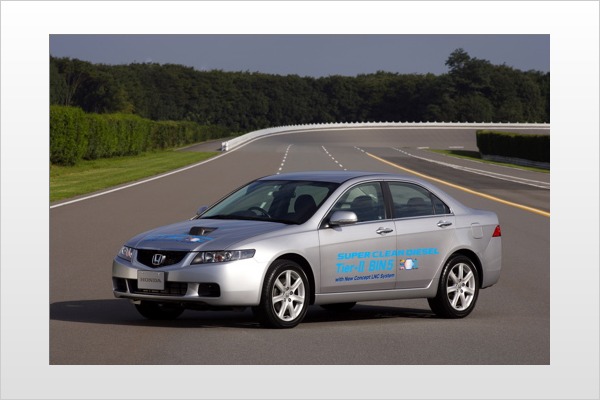
Honda Motors latest development in diesel technology puts the carmaker well ahead of the pack in the race to bring clean diesel vehicles to market. Its next-generation diesel engine uses a catalytic converter requiring no additives of any kind and will run cleaner through its new design.
As of January 2007, all diesel passenger vehicles sold in the United States are required to meet the same Environmental Protection Agency Tier II Bin 5 emission standards governing all gasoline vehicles. This requires auto manufacturers to significantly reduce the particulate matter (PM) and nitrogen oxide (NOx) that escape their car's tailpipes. While particulate traps significantly reduce PM, most manufacturers of diesel engines are still struggling with a way to clean up their NOx emissions.
Until now, most car companies have been working on systems that utilize chemical urea. When sprayed into the hot exhaust of the engine, it creates ammonia. The ammonia then reacts with the NOx and converts it to inert nitrogen.
What sets Honda's new technology apart is that its catalytic converter requires no outside chemicals whatsoever. As the exhaust hits the first layer of the unit, a small amount of NOx is converted to ammonia, which is then absorbed by a second layer. The second layer, now ammonia rich, then reacts with the remaining NOx and spits it out as harmless nitrogen.
Honda spokesman Chris Martin points out that what makes the system better is that the ammonia is generated internally rather than being introduced as an added chemical.
"It's maintenance proof," he said, adding that with urea-based systems, a car owner could either fall behind on maintenance or opt to save money by not replacing the chemical. "It might run just as well, but it would be much dirtier."
With Honda's new technology in place, the car does everything for you; nothing extra to add, nothing to check and nothing to maintain. This should save the owner money, and Honda can rest assured that its diesel engines will continue to drive cleanly as long as they are on the road.
Honda designed the converter for use in its 2.2 iCTDi diesel engine, which has garnered widespread attention since its debut in the current model European Accord. The engine, which is remarkably quiet, is also much cleaner than most diesels right out of the gate. Thanks to a redesigned combustion chamber, a reduction in fuel injection time and other efficiency improvements, the engine already emits significantly less NOx. Add on the new technology the converter affords, and clean diesel could be right around the corner.
While European drivers may be seeing this technology sooner than we will, Honda estimates that their diesel vehicles will start hitting our shores in about three years. Couple this with their recent announcement concerning future diesel hybrid vehicles, and it looks as if Honda is pulling to the head of the clean diesel pack.